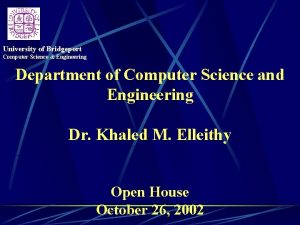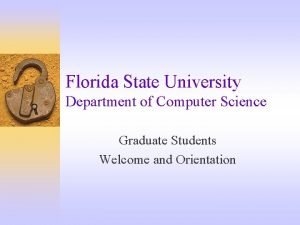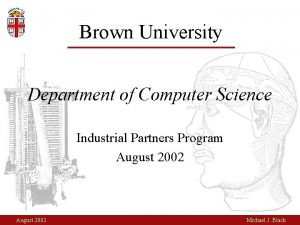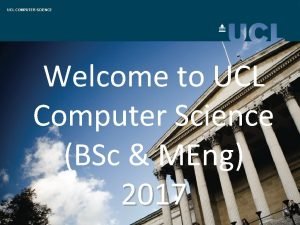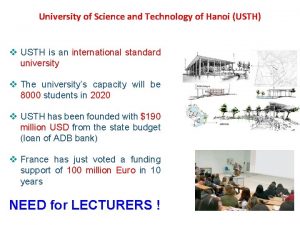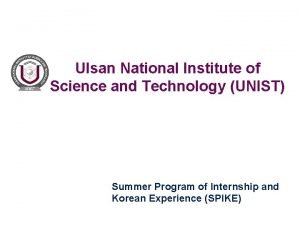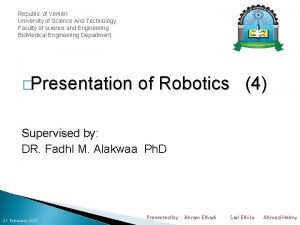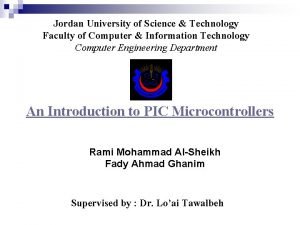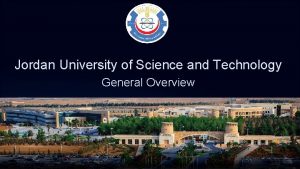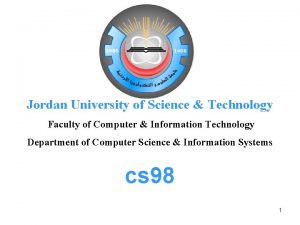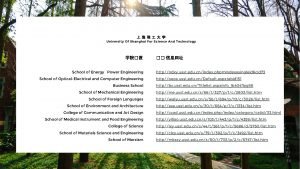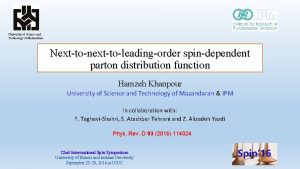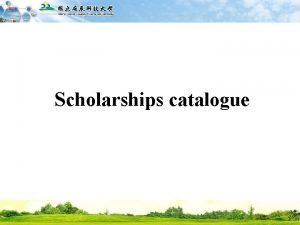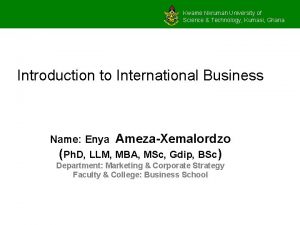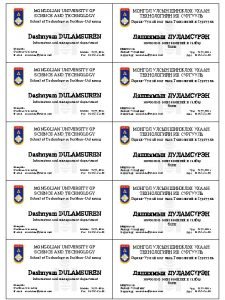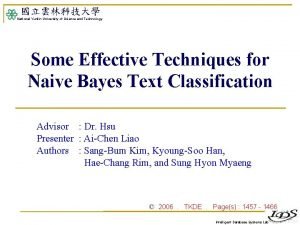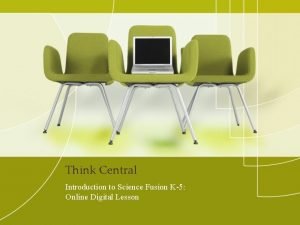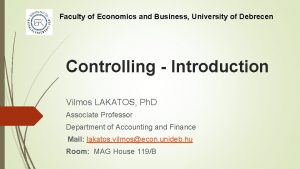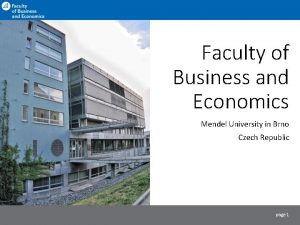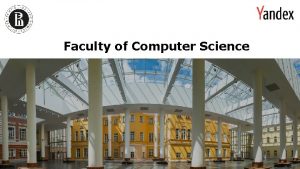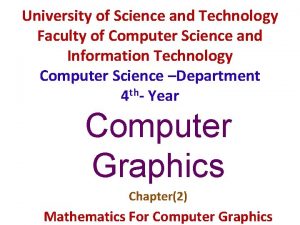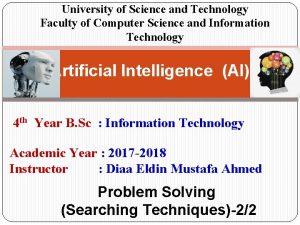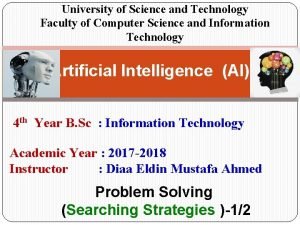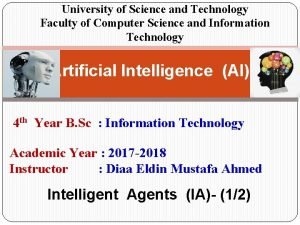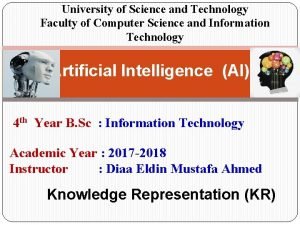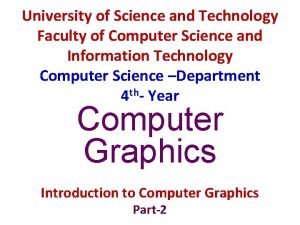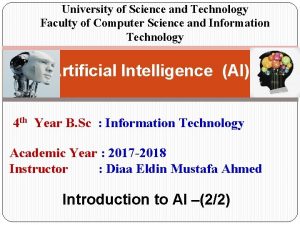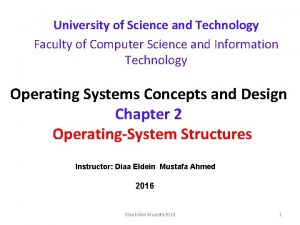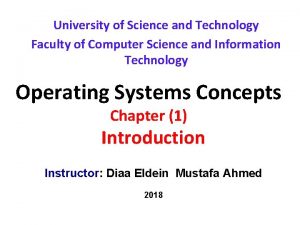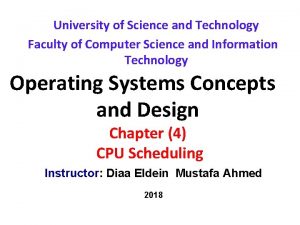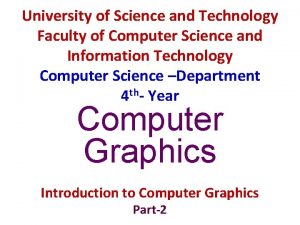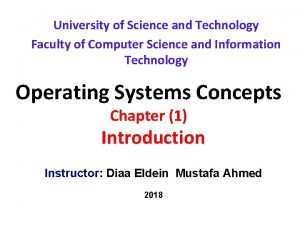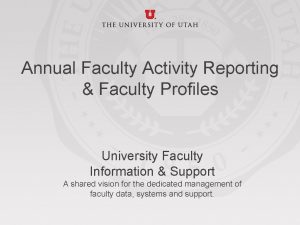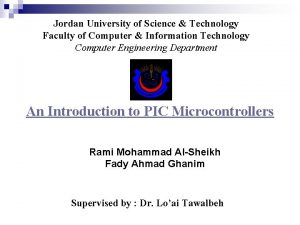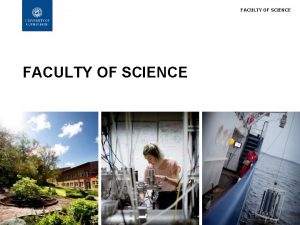University of Science and Technology Faculty of Computer




















- Slides: 20

University of Science and Technology Faculty of Computer Science and Information Technology Artificial Intelligence (AI) 4 th Year B. Sc : Information Technology Academic Year : 2017 -2018 Instructor : Diaa Eldin Mustafa Ahmed Introduction to AI –(1/2)

Overview of Human Intelligence and Science challenges q. Philosophers have been trying for over two thousand years to understand resolve two big questions of the universe: Ø How does a human mind work ? And ﻛﻴﻒ ﻳﻌﻤﻞ ﻋﻘﻞ ﺍﻹﻧﺴﺎﻥ Ø Can non-humans (machines/ Software) have minds? ﺍﻟﺒﺮﻣﺠﻴﺎﺕ( ﻋﻘﻞ / ﻫﻞ ﻣﻦ ﺍﻟﻤﻤﻜﻦ ﺃﻦ ﻳﻜﻮﻥ )ﻟﻶﻼﺕ q However, these questions are still unanswered. 2 AI - (2017 -2018) -Diaa Eldein Mustafa - Lecture (0) -Introduction to Artificial Intelligence

Overview of Human Intelligence and Science Challenges 3 AI -(2017 -2018) -Diaa Eldein Mustafa - Lecture (0) -Introduction to Artificial Intelligence

Overview of Human Intelligence and Science challenges q. Some philosophers have picked up the computational approach originated by computer scientists and accepted the idea that machines can do everything that humans can do. q. Others have openly opposed this idea, claiming that such highly sophisticated behaviors such as love, creative discovery and moral choice will always be beyond the scope of any machine. 4 AI - (2017 -2018) -Diaa Eldein Mustafa - Lecture (0) -Introduction to Artificial Intelligence

Overview of Human Intelligence and Science challenges q The nature of philosophy allows for disagreements to remain unresolved. q In fact, engineers and scientists have already built machines that we can call ‘intelligent’. So what does the word ‘intelligence’ mean? q Let us look at a dictionary definition. 1 - Someone’s intelligence is their ability to understand learn things. 2 - Intelligence is the ability to think and understand instead of doing things by instinct or automatically 5 AI - (2017 -2018) -Diaa Eldein Mustafa - Lecture (0) -Introduction to Artificial Intelligence

What is Human Intelligence ? q It is composed of : Ø Thinking (abstractly, using analogies) Ø Learning and understanding from experience Ø Knowledge applying successfully in new situations Ø Acting in complex environments, Ø Perceiving one’s environment Ø Automated behaviors. Ø Solve problems and to make decisions. Ø Pattern matching and recognition. Ø Reasoning (to solve problems and discover hidden knowledge) Ø Inference and prediction. Ø Perception. Ø Analysis. Ø Linguistic Intelligence. Ø Creativity , Ingenuity , Expressive-ness, Curiosity. 6 AI - (2017 -2018) -Diaa Eldein Mustafa - Lecture (0) -Introduction to Artificial Intelligence

What is Human Intelligence ? 7 AI - (2017 -2018) -Diaa Eldein Mustafa - Lecture (0) -Introduction to Artificial Intelligence

What is Intelligent Systems ? q. The ability of a system to : Ø Ø Ø Ø 8 Calculate Reason Perceive relationships and analogies Learn from experience Store and retrieve information from memory Solve problems, comprehend complex ideas Use natural language fluently Classify, generalize, and adapt new situations. AI - (2017 -2018) -Diaa Eldein Mustafa - Lecture (0) -Introduction to Artificial Intelligence

Why study AI? Internet Search engines Medicine/ Diagnosis Science Labor Industry Appliances 9 Automation Self-Driving AI - (2017 -2018) -Diaa Eldein Mustafa - Lecture (0) -Introduction to Artificial Intelligence Science What else?

Course Learning Outcomes At the end of this course the students should be : q Knowledge and Understanding You should have a knowledge and understanding of the basic concepts of Artificial Intelligence including problem solving , Search strategies , Knowledge Representation(KR) , Game playing , Machine Learning, Expert Systems , Fuzzy Logic and Neural Networks (NN). q Intellectual Skills You should be able to use this knowledge and understanding of appropriate principles and guidelines to synthesise solutions to tasks in AI and to critically evaluate alternatives. q Practical Skills You should be able to use a well known declarative language (Prolog) and to construct simple AI programs. 10 AI - (2017 -2018) -Diaa Eldein Mustafa - Lecture (0) -Introduction to Artificial Intelligence

Course Learning Outcomes Transferable Skills You should be able to solve problems and evaluate outcomes and alternatives 11 AI - (2017 -2018) -Diaa Eldein Mustafa - Lecture (0) -Introduction to Artificial Intelligence

Course Contents and Schedule q. Introduction to AI (Lecture 0, 1) ü Definition ü History ü Applications üThe state of art and research areas q. Intelligent Agents (Lecture 2, 3) üAgents and environment üGood behavior ü The concept of rationality ü The nature of environments ü Structure of agents 12 AI - (2017 -2018) -Diaa Eldein Mustafa - Lecture (0) -Introduction to Artificial Intelligence

Course Contents and Schedule q. Problem Solving (Solving Problems by Searching strategies) (lecture 4 , 5) üUninformed Search Breadth-First Search(BFS) ü Uniform-Cost Search(UCS) ü Depth-First Search(DFS) ü Depth-Limited Search(DLS) üIterative deepening search ü üHeuristic Search ü Best First Search ü Constraint Satisfaction Problems (CSP) ü Game Tree Search 13 AI - (2017 -2018) -Diaa Eldein Mustafa - Lecture (0) -Introduction to Artificial Intelligence

Course Contents and Schedule q. Representation of knowledge (lecture 6) üPropositional logic üfirst order predicate logic q. Knowledge inference (lecture 7, 8) üProduction based system ü Frame based system. ü Inference - Backward chaining ü Forward chaining ü Rule value approach üFuzzy reasoning 14 AI - (2017 -2018) -Diaa Eldein Mustafa - Lecture (0) -Introduction to Artificial Intelligence

Course Contents and Schedule q. Expert systems (lecture 9) üArchitecture of expert systems, ü Roles of expert systems üKnowledge Acquisition , Meta knowledge, Heuristics ü Typical expert systems - MYCIN, DART, XOON ü Expert systems shells. q. Machine Learning (Lecture 10) üA General Model of Learning ü Types of Learning Systems ü Knowledge-Free Inductive Learning Systems ü Learning from Single Examples 15 AI - (2017 -2018) -Diaa Eldein Mustafa - Lecture (0) -Introduction to Artificial Intelligence

Course Contents and Schedule q. Fuzzy Logic (Lecture 11, 12) üWhat is Fuzzy Logic? üFuzzy Logic Systems Architecture üFuzzy Set Theory üCrisp and Non-Crisp Set ü Membership Function üApplication Areas of Fuzzy Logic q. Neural Networks (Lectures 13 , 14) üIntroduction, or how the brain works ? ü The neuron as a simple computing element ü The perceptron üMultilayer neural networks 16 AI - (2017 -2018) -Diaa Eldein Mustafa - Lecture (0) -Introduction to Artificial Intelligence

Assessment Criteria Test at the 8 th week 17 20 % Course Works ( Laboratory Assignment)20% Attendance 0 % Final Exam 60 % * Each student absent more than 4 lectures AI - (2017 -2018) -Diaa Eldein Mustafa - Lecture will be withdrawn (0) -Introduction to Artificial Intelligence the final exam , and their

Attendance q I expect you they attend all the lectures. q The lecture notes(docx) and Power Point(ppt) presentations dropped in (acadox. com) cover all the topics. q These notes are do not contain much details of discussion. q The lectures will consist of slides (Power-point ), spoken material, and additional examples given on the blackboard. q In order to understand the subject and the reasons for studying the material you will need to attend the lectures and take notes to supplement lecture slides. q This is your responsibility. If there is anything you do not understand during the lectures, then ask, either during or after the lecture. q In addition , you must use the text book to supplement the lecture material by reading around the subjects. . 18 AI - (2017 -2018) -Diaa Eldein Mustafa - Lecture (0) -Introduction to Artificial Intelligence

Text Books and References Text Book: Artificial Intelligence: A Modern Approach, Stuart J. Russell and Peter Norvig , 3 rd Edition 2010 19 AI - (2017 -2018) -Diaa Eldein Mustafa - Lecture (0) -Introduction to Artificial Intelligence

Thank You End Questions ? 20 AI - (2017 -2018) -Diaa Eldein Mustafa - Lecture (0) -Introduction to Artificial Intelligence
 University of bridgeport engineering
University of bridgeport engineering University of bridgeport engineering
University of bridgeport engineering Florida state computer science
Florida state computer science Brown university computer science faculty
Brown university computer science faculty Ucl bsc computer science
Ucl bsc computer science Usth
Usth Spike unist internship
Spike unist internship Science and technology university yemen
Science and technology university yemen Jordan university of science and technology
Jordan university of science and technology Jordan university of science and technology
Jordan university of science and technology Jordan university of science and technology
Jordan university of science and technology University of shanghai for science and technology
University of shanghai for science and technology Hamzeh khanpour
Hamzeh khanpour Pingtung university of science and technology
Pingtung university of science and technology University of science and technology kumasi
University of science and technology kumasi Mongolian university of science and technology logo
Mongolian university of science and technology logo National yunlin university of science and technology
National yunlin university of science and technology Think central k5
Think central k5 Faculty of business and economics mendel university in brno
Faculty of business and economics mendel university in brno University of debrecen faculty of economics and business
University of debrecen faculty of economics and business Mendel university faculty of business and economics
Mendel university faculty of business and economics

